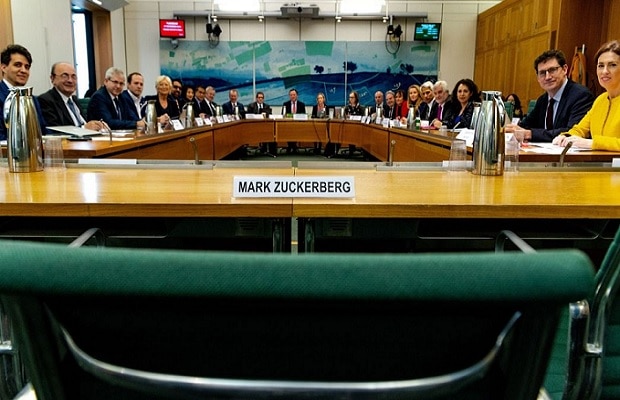
The event is part of an international inquiry into disinformation and fake news. (Photo credit above: Gabriel Sainhas)
Richard Allan, Facebook’s vice-president of policy solutions, appeared in Zuckerberg’s place. He said he took responsibility for deciding who appeared at which committee.
Allan – a Liberal Democrat peer – is being quizzed by UK MPs and parliamentarians.
The session was attended by parliamentarians from Argentina, Belgium, Brazil, Canada, France, Ireland, Latvia, and Singapore as well as members of the UK’s Digital, Culture, Media and Sport Committee.
At the time of the hearing, the committee shared a picture of the empty and seat and nameplate, stating: “Nine countries. 24 official representatives. 447 million people represented. One question: where is Mark Zuckerberg?”
9 countries.
24 official representatives.
447 million people represented.One question: where is Mark Zuckerberg? pic.twitter.com/BK3KrKvQf3
— Digital, Culture, Media and Sport Committee (@CommonsCMS) November 27, 2018
The hearing follows the unusual seizure of internal Facebook documents from another company by the committee using parliament’s ancient legal powers.
At the time, the committee’s chairman, Damian Collins, told The Observer: “We are in uncharted territory. This is an unprecedented move but it’s an unprecedented situation. We’ve failed to get answers from Facebook and we believe the documents contain information of very high public interest.”
Addressing Allan on Tuesday, Collins said the committee was unable to publish information contained in the documents but noted a single incident.
He said: “An engineer at Facebook notified the company in 2014 that entities with Russian IP addresses had been using a Pinterest API key to pull over three billion data points a day through the Ordered Friends API. Now, was that reported to any external body at the time?”
It is not currently clear what these “data points” were regarding nor whether they could have provided personally identifiable information or simply amounted to non-sensitive technical data.
Allan stressed that the emails which the committee had received were partial and not representative of Facebook’s policy, as much as they were the position of the company they had been collected from.
Collins said: “If you don’t have the answer to it, I’d like Facebook to report back to the committee to say what internal process it ran when this was reported to the company by an engineer, and did they notify external agencies of this activity?
View the livestream of the committee hearing here:
LIVE: International Grand Committee on disinformation and ‘fake news’ questions Facebook and Information Commission… https://t.co/Z0GETruTQn
— Digital, Culture, Media and Sport Committee (@CommonsCMS) November 27, 2018
